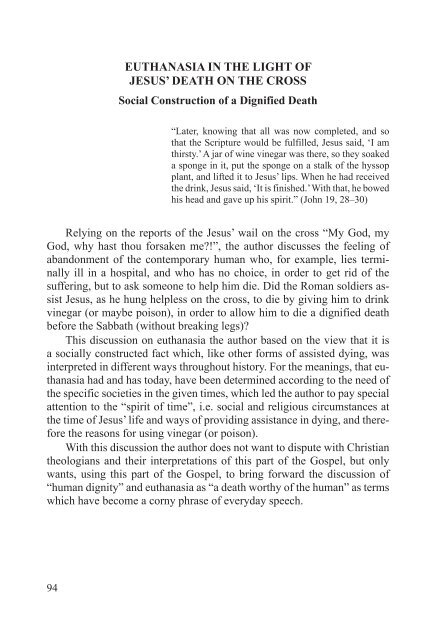Programska knjižnica 9. Lošinjskih dana bioetike - Hrvatsko ...
Programska knjižnica 9. Lošinjskih dana bioetike - Hrvatsko ...
Programska knjižnica 9. Lošinjskih dana bioetike - Hrvatsko ...
You also want an ePaper? Increase the reach of your titles
YUMPU automatically turns print PDFs into web optimized ePapers that Google loves.
EUTHANASIA IN THE LIGHT OF<br />
JESUS’ DEATH ON THE CROSS<br />
Social Construction of a Dignified Death<br />
“Later, knowing that all was now completed, and so<br />
that the Scripture would be fulfilled, Jesus said, ‘I am<br />
thirsty.’ A jar of wine vinegar was there, so they soaked<br />
a sponge in it, put the sponge on a stalk of the hyssop<br />
plant, and lifted it to Jesus’ lips. When he had received<br />
the drink, Jesus said, ‘It is finished.’ With that, he bowed<br />
his head and gave up his spirit.” (John 19, 28–30)<br />
Relying on the reports of the Jesus’ wail on the cross “My God, my<br />
God, why hast thou forsaken me?!”, the author discusses the feeling of<br />
abandonment of the contemporary human who, for example, lies terminally<br />
ill in a hospital, and who has no choice, in order to get rid of the<br />
suffering, but to ask someone to help him die. Did the Roman soldiers assist<br />
Jesus, as he hung helpless on the cross, to die by giving him to drink<br />
vinegar (or maybe poison), in order to allow him to die a dignified death<br />
before the Sabbath (without breaking legs)?<br />
This discussion on euthanasia the author based on the view that it is<br />
a socially constructed fact which, like other forms of assisted dying, was<br />
interpreted in different ways throughout history. For the meanings, that euthanasia<br />
had and has today, have been determined according to the need of<br />
the specific societies in the given times, which led the author to pay special<br />
attention to the “spirit of time”, i.e. social and religious circumstances at<br />
the time of Jesus’ life and ways of providing assistance in dying, and therefore<br />
the reasons for using vinegar (or poison).<br />
With this discussion the author does not want to dispute with Christian<br />
theologians and their interpretations of this part of the Gospel, but only<br />
wants, using this part of the Gospel, to bring forward the discussion of<br />
“human dignity” and euthanasia as “a death worthy of the human” as terms<br />
which have become a corny phrase of everyday speech.<br />
94

















